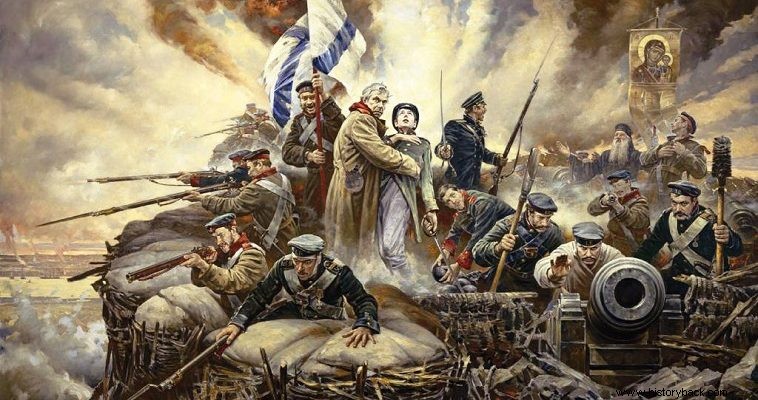
The conflict that led to the outbreak of the Crimean War began in 1848, far away from the Crimea, in the Holy Land. In 1847 a conflict broke out over control of the Church of the Nativity in Bethlehem. At that time only the Orthodox and pre-Chalcedonian Armenians had the keys to the temple, granting the right to use it to the Roman Catholics.
At one point a silver star was stolen from the temple, an offering of the Roman Catholics to him. This event intensified the conflict between the different Christian denominations , which actually started in 1845, when, for the first time since 1291, Pope Pius IX sent a Roman Catholic patriarch to Jerusalem.
Gradually the conflict of doctrines developed into politics, with France, Spain, Portugal, Piedmont, the Kingdom of Naples and Belgium, exerting diplomatic pressure on the Ottomans, in favor of the Roman Catholics, in the Holy Land. France especially, assumed the role of protector of the Roman Catholics. Thanks to her support, the pope began to intensify his demands, now asking to have control over the church of the Holy Sepulcher and the tomb of the Virgin Mary, in Gethimani.
The Turks, for their part, initially showed little interest in the disputes of the "infidels", watching them, not without pleasure. But when the situation started to get out of hand, they convened, in Jerusalem, in 1851, a meeting of representatives of the three Christian denominations, which, however, ended nowhere. Finally, the decision of the Turks to give keys to the Church of the Nativity to the Roman Catholics as well, provoked a strong reaction from the Orthodox.
So the Turks let things play out, thinking that over time the conflict would die down. The exact opposite happened. Louis Napoleon n, nephew of Napoleon the Great, who, in 1852, became emperor under the name Napoleon III had the idea of involving France in the Holy Land.
Britain had no sympathy for France. Ultimately, however, Russia proved more dangerous to British interests. The conflict between Britain and Russia was initially of a commercial nature. The last thing the British wanted was the further strengthening of Russia. Any Russian attempt, therefore, to exploit the weakness of the Ottoman Empire, was seen as a serious threat to Britain. The British, especially, would never allow the Russians to dominate the Dardanelles and Persia.
At the end of 1852 tsar Nikolaos A ’ decided to escalate his pressure against the Turks, on the issue of the Holy Lands, presenting Russia as the protector power of the Orthodox. The main reasons for the Russian pressure on the Turks were the delivery by them of the keys of the Church of the Nativity to the Roman Catholics, as mentioned.
The tsar decided that the moment had come to realize the eternal Russian dream, to dissolve the Ottoman Empire and bring Russia to the "warm" seas. Thus Nikolaos developed a great diplomatic effort. In the first year he decided to send Prince Alexander Menchikov to Constantinople, with the aim of suffocating the Turks.
The orders Medchikov received were clear. He had to pressure the Turks to confirm all the old privileges to the Greek Orthodox Patriarchate of Jerusalem. This was the lowest request and aimed at humiliating the sultan, but also Napoleon III of France, who appeared as the protector of the Roman Catholics.
But the main request was different. Russia demanded that the sultan recognize it, officially, as the protecting power of the Orthodox Christians of the Ottoman Empire. This request, if accepted, would allow Russia to intervene, as they see fit, in the internal affairs of the Ottoman state. Consequently, this request could not, officially, as requested by Russia, be accepted.
The Turks accepted the "religious" terms of the Russians. However, the whole controversy had escaped the religious context. On May 5, 1853 Medchikov issued an ultimatum to the Turks, according to which they had five days to accept Russian "protection" over their Orthodox subjects. The Turks, however, refused to allow Russia to assume the role of protector of the Orthodox.
Not accepting his terms angered the tsar. On July 2, 1853 two Russian army corps, with a total of 50,000 men invaded demilitarized Moldavia. By July 15, the Russians had advanced to Bucharest, in the Principality of Wallachia, almost without resistance. Negotiations continued in Vienna until September 1853, but without result.
The British and French reacted strongly against Russia, who, fearing possible Russian action to occupy Constantinople, they agreed to send their Mediterranean fleets there, covering the City from a Russian attack. The Turks took advantage of the protection and diplomatic weight given to them by the presence of the allied fleets in Constantinople, sending an ultimatum, on October 8, 1853, to the Russians. The Russians simply ignored the Turkish ultimatum and the Turks declared war on them on October 4, 1853. The British and French followed… Christian beings.
